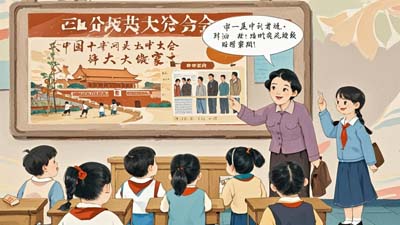
Lăoshī: Sānzhōngquánhuì hòu, zhōngguó zuì dà de biànhuà shì shénme?
老师: 三中全会 后, 中国 最 大 的 变化 是 什么?
Teacher: What was the greatest change in China after the Third Plenary Session?
Xuésheng: Sānzhōngquánhuì hòu, zhōngguó zuì dà de biànhuà shì nóngmín yuè lái yuè guì le.
学生: 三中全会 后, 中国 最 大 的 变化 是 农民 越 来 越 贵 了。
Student: The greatest change was that the farmers became more and more expensive after the Third Plenary Session.
Lăoshī : Shì fù bú shì guì.
老师: 是 富 不 是 贵。
Teacher: It is rich, not expensive.
In this joke, the student can’t distinguish between the two words 富(fù) and 贵(guì). They both mean prosperity. 富(fù) means rich and wealthy, so people usually use it to refer to someone who is very successful, while 贵(guì) means expensive, so people usually use it to describe something expensive to buy.



